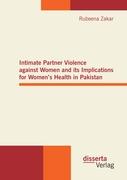- Start
- Intimate Partner Violence against Women and its Implications for Women¿s Health in Pakistan
Intimate Partner Violence against Women and its Implications for Women¿s Health in Pakistan
Angebote / Angebote:
Like other developing countries, in Pakistan, women are frequently victims of intimate partner violence. Studying violence in a conservative patriarchal set-up is a challenging task as the issue is denied and usually concealed under the cloak of "family privacy". Thus far, in Pakistan, intimate partner violence is not recognized as a public health and developmental issue. This study intends to fill this research gap and documents intimate partner violence as a public health issue by investigating its association with women's mental and reproductive health in Pakistan.
This research is theoretically embedded in the "integrated ecological framework" introduced by Heise (1998) to explain and explicate the complexity of the phenomenon of intimate partner violence. In patriarchal societies, girls are usually socialized in such a way that they become submissive and dependent on men. In order to ensure women's docility and "obedience", women are subjected to control, discipline and, sometimes, violent punishment (Foucault 1977). The core assumption of this research is that violence or threat of violence damages women's physical, mental and reproductive health. Arguably, violence also constricts women's ability to develop essential capabilities to live an independent and dignified life (Nussbaum 2005).
Data showed that the acts of violence rendered substantial damage to women's mental and reproductive health. It was found that sexual violence was significantly associated with non-use of contraceptives and unintended pregnancies which may lead to unsafe and high risk abortions. The qualitative data revealed that physicians and other stakeholders (e.g. religious leaders, community leaders) lacked competence, training and resources to provide comprehensive care to the victims. This study demonstrates that without protecting women from violence, Pakistan cannot achieve Millennium Development Goals especially reduction in infant and maternal mortality, gender equality, and women's active participation in socio-economic development.
The empirical data also suggested that the adverse effects of violence are far-reaching, be it inflicted in the past or present. It is high time to recognize the violence-induced damages done to women's health and its resultant developmental cost. Thus far, the narrow legalistic approach and reductionist biomedical model have not been proved very effective. The problem needs a holistic approach and collective efforts by civil society, health care professionals, and religious leaders to proactively support and empower women to reduce their vulnerabilities and help them to stand-up against violence.
Folgt in ca. 5 Arbeitstagen

